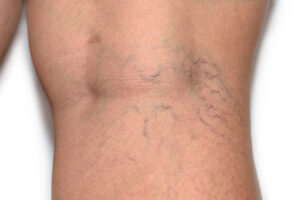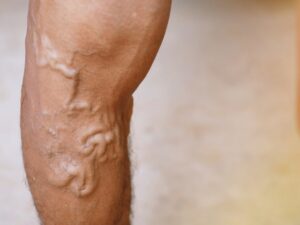Some individuals, especially adult women, experience a condition where blood vessels become enlarged and prominently bluish, particularly in the legs. This health issue is known as varicose veins, a disease related to venous blood vessels. Patients with this condition typically experience swollen and enlarged veins.
Varicose veins occur due to blood flow problems caused by the failure of venous valves to function optimally. This leads to blood pooling in the veins, which in turn puts pressure on them. While this condition can affect blood vessels in any part of the body, it is more common in the legs. Over time, the veins lose their elasticity and become permanently enlarged.
Risk Factors and symptoms of varicose veins
Several risk factors are associated with varicose veins, including:
- Female
- Age between 40 and 80 years
- A family history of varicose veins
- Prolonged coughing and constipation
- Obesity
- Pregnancy
- Frequently standing for extended periods
In addition to the bulging blood vessels under the skin that appear bluish due to swollen veins, there are also other symptoms experienced by patients, such as swelling in the calves, ankles, and feet. The leg muscles may also become easily fatigued and sore, causing the legs to feel heavy and limiting movement.
Some patients may feel discomfort, pain, and warmth in the affected blood vessels. Additionally, the affected area may become itchy, and in more severe cases, develop ulcers or wounds.
Treatment for varicose veins
There are several treatment options for varicose veins. Doctor will assess the patient’s health status and the severity of the condition to determine the most appropriate course of treatment.
Non-pharmacological methods, also known as conservative treatments, are often considered for patients with varicose veins. The use of compression stockings is suitable for patients with varicose veins in the legs. These compression stockings are readily available in the market, for example, in community pharmacies. Pharmacists can assist patients in selecting appropriate compression stockings.
Additionally, doctors may recommend taking oral medicine that combines diosmin and hesperidin. This medicine can improve vein elasticity, thereby strengthening blood vessels. They also help protect small blood vessels. The combination of diosmin and hesperidin tablets is usually taken twice daily. Common side effects include diarrhoea, nausea, stomach pain, itching, and rashes. Women who are breastfeeding should consult a doctor or pharmacist before taking this medicine.
There are also procedures or surgical options, such as sclerotherapy, which can be performed for suitable patients after a thorough examination by a doctor. In sclerotherapy, a medicine called sodium tetradecyl sulfate is injected into the problematic vein. It reduces the dilation of the blood vessels and promotes blood flow into the remaining normal blood vessels. As such, this effect helps to gradually fade the visible veins caused by varicose veins.
Sodium tetradecyl sulfate injections are typically used for mild varicose veins. Sclerotherapy does not produce permanent effects and may need to be performed multiple times to achieve better results. Side effects of sodium tetradecyl sulfate injections include pain, itching, or irritation at the injection site, headaches, nausea, and vomiting.
 Advice for patients and the public
Advice for patients and the public
Although various factors can increase the risk of varicose veins, this condition can be prevented. The public is advised to adjust their lifestyle and daily activities to reduce the risk of varicose veins. This includes avoiding prolonged sitting or standing to ensure smooth blood flow. It is also recommended to wear clothing that fits comfortably and avoid excessively tight pants. Obese individuals should strive to lose weight by following a balanced diet and consistent exercise.
In conclusion, varicose veins are a blood vessel disease that poses a risk to one’s health and can reduce a person’s quality of life. Appropriate preventive measures can be taken to reduce the risk of varicose veins. If symptoms of varicose veins arise, consult a doctor immediately for timely treatment if necessary.
Any further enquiries regarding medicines can be submitted to the National Pharmacy Call Center (NPCC) through 1-800-88-6722 on Monday to Friday, from 8am to 5pm except on public holidays.
This article was prepared by Audrey Lim Huili (Pharmacist) from the Institut Penyelidikan Klinikal for Bahagian Amalan dan Perkembangan Farmasi (BAPF), KKM x The Malaysian Medical Gazette Series. It is hoped that this collaboration will help prpogate information regarding medication to the general public.
References:
Hamdan A.(2012) Management of varicose veins and venous insufficiency.JAMA.; 308:2612–2621
Jones, RH & Carek, PJ (2008) Management of Varicose Veins. Am Fam Physician. 2008 Dec 1;78(11):1289-1294.
Tucker, R (2019) How can pharmacists help patients with varicose veins? https://www.thepharmacist.co.uk/clinical/how-can-pharmacists-help-patients-with-varicose-veins/ (Retrieved 10 Jan 2020)
Adenan, MS (2014) Vena varikos.MyHealth portal. http://www.myhealth.gov.my/vena-varikos/ (Retrieved 10 Jan 2020)
https://www.mayoclinic.org/tests-procedures/sclerotherapy/about/pac-20384592
https://go.drugbank.com/drugs/DB00464
https://www.drugs.com/mtm/sodium-tetradecyl-sulfate.html
https://www.merckmanuals.com/professional/cardiovascular-disorders/peripheral-venous-disorders/varicose-veins#Treatment_v941547
https://bestpractice.bmj.com/topics/en-gb/630
https://www.mayoclinic.org/diseases-conditions/varicose-veins/symptoms-causes/syc-20350643
https://www.aafp.org/pubs/afp/issues/2019/0601/p682.html
Sodium Tetradecyl Sulphate | Intranet Pharmacy


